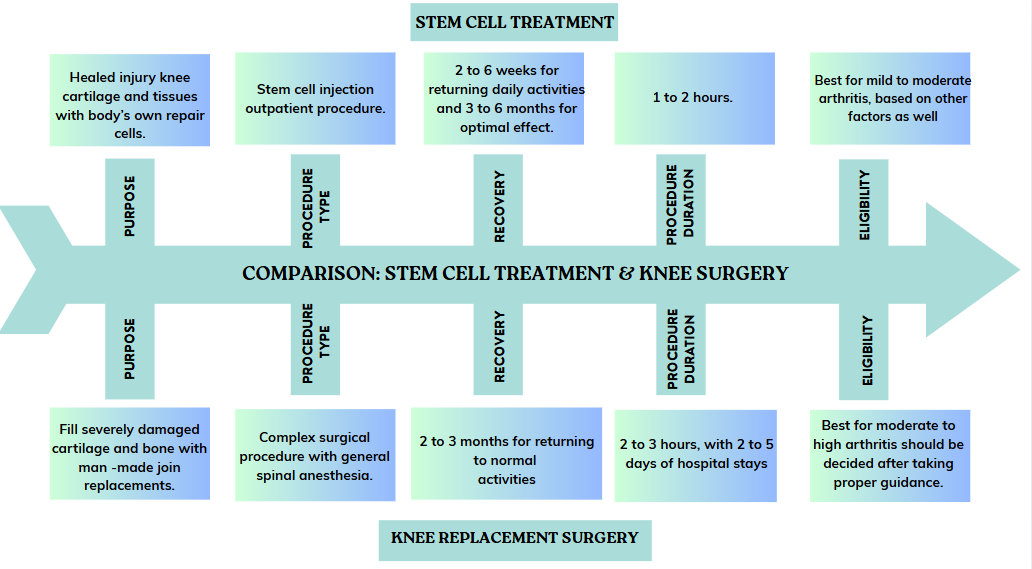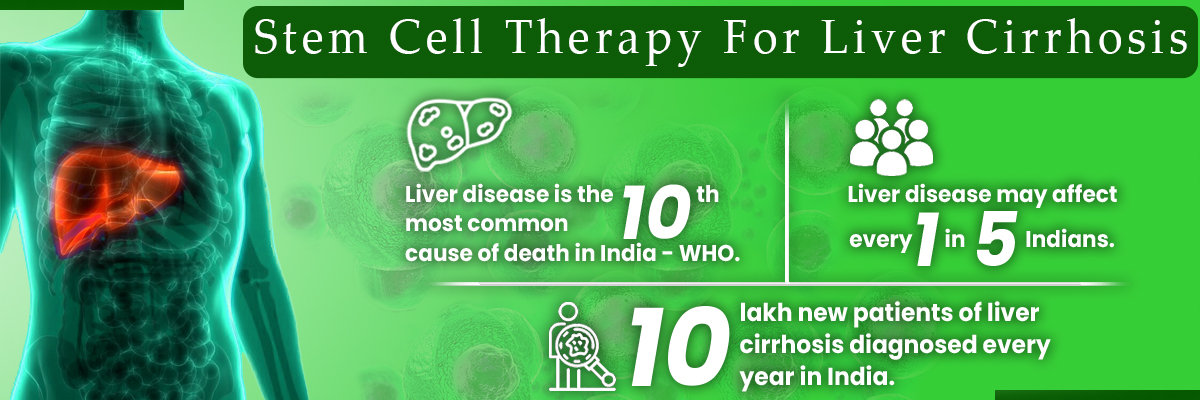Overview
Knee pain is more than a nuisance - to many, it's a debilitating condition that affects mobility, mood, and overall autonomy. Whatever the cause - age related osteoarthritis, injury, or long-term degenerative wear and tear - knee pain pushes many in the direction of knee replacement surgery - an old reliable with decades of success. But today, a regenerative revolution is redefining the playbook: stem cell therapy, which uses your body's own repair mechanisms to restore damaged tissue.
The concept of repairing rather than replacing is catching on fast. No metal implants, no extensive rehab, and a procedure that takes less than two hours — that's the promise of stem cell therapy. Although knee replacement remains the standard for advanced arthritis, stem cell therapy is becoming a promising alternative, especially for younger patients, athletes, or those with moderate injury seeking a less invasive option. To connect with top orthopedic surgeon please fill out the lead form.
Comparison: Stem cell treatment & Knee replacement surgery

Advantages & Benefits
Stem cell treatment -
- Fast Recovery - Most can return to their daily lives within weeks. Effects are felt within 3–6 months — still faster than surgery.
- Minimal Danger: No anesthesia and no surgery complications. Expected side effects are merely temporary stiffness or swelling.
- Regeneration Over Replacement: Instead of replacing the joint, stem cell treatment induces regeneration of tissue, aiming for the return of native function.
- Outpatient & Quick: No hospital overnight stay. Most procedures take less than 2 hours, and patients can walk out the same day.
Knee Replacement Surgery -
- Very Effective for Severe Damage: If there is severe arthritis or trauma, knee replacement can really improve mobility and quality of life.
- High Satisfaction Rates: In case of knee surgery more than 90% of patients show a noticeable difference, and most are again able to do things they had to give up.
- Relief for the Long Term: Implants last for 15–20 years, and most patients resume an incredibly active lifestyle once they have recovered.
Risks Associated
Stem cell treatment -
- Limited Research for the Long Term: Even though early results are promising, we don't yet have 20-year follow-up data to compare with traditional surgery.
- Variable Outcomes: Patient response is unpredictable; some may need repeat treatments.
- Transient Side Effects: Mild pain, swelling, or stiffness in the joint may follow injection.
- Preservation: There must be adequate infrastructure for stem cell preservation.
Knee Replacement Surgery -
- Serious Surgery Risks: Infection, blood clots, implant failure, and complications from anesthesia are all risks in knee surgery.
- Potential Chronic Pain: Some patients have persistent pain or stiffness, even after healing.
- Longer Recovery: In case of knee replacement full recovery typically takes 6–12 months, with significant physical therapy
The choice between Stem Cell Treatment & Knee Surgery must depend on: your age, level of arthritis, long-term expectations and your orthopedic doctor's advice. Don't jump to conclusions - educate yourself, evaluate your situation, and choose what is right for your body and lifestyle. For personalized advice or questions about stem cell treatment or knee replacement surgery, experts insights are just click away. Reaching out directly can help you clarify your next steps.

Latest Updates you should know
Out of all the innovations and developments taking place daily in the field of stem cell treatment and knee surgery, some of the important innovations are listed below:
- FDA Breakthrough Designation: Nature Cell's Joint Stem, developed from autologous adipose-derived stem cells, received FDA breakthrough therapy designation in 2023 — an enormous worldwide endorsement of regenerative therapies.
- 39M$ Grant for Living Knee: Scientists at Columbia University received a $39 million grant to develop a "living" knee replacement that incorporates stem cells into biocompatible materials — promising an organic knee regeneration future.
- UC Davis Cartilage Implant Breakthrough: A novel bio restorable implant developed at UC Davis showed superior outcomes in early human trials — re growing cartilage and delaying joint replacement.

Success Rate
Stem Cell Treatment:
Clinical trials show 80–85% success in the return of joint function and pain relief for mild-to-moderate cases. A 2021 Journal of Translational Medicine meta-analysis supported stem cells significantly improving cartilage health and symptom relief.
Knee Surgery:
According to the American Academy of Orthopedic Surgeons (AAOS), 90–95% of knee replacements remain active at 10 years, and 82% at 25 years — an extremely good long-term success.
The success of operation whether it is a stem cell treatment or knee replacement surgery is based on various factors and is subjective from patient to patient. The success rate mentioned are just for the reference purpose.
Cost: Stem Cell Treatment & Knee Replacement Surgery
Cost usually of both knee surgery and stem cell treatment depends on factors such as hospitals, cities and degree of treatment needed. Their is stem cell preservation cost in case of stem cell treatment which the patient has to bare. It's always wise to have an approximate cost of the treatment in hand, to be able to take a well-informed decision.
| No | Name of the Treatment | Cost |
| 1) | Stem Cell Treatment | 5,000 $ (per knee) |
| 2) | Stem cell preservation cost (Initial collection & storage + Annual storage fees) | 1,700 $ |
| 3) | Knee replacement surgery | 6,500 $ (per knee) |
Though there is a ballpark figure mentioned in the above given table, deriving the exact cost of the treatment is difficult as we have to consider multiple factors like - city, hospital, type of treatment, severity of the disease. Out of all these hospital in which treatment is taken plays a vital role and has significant impact on the cost of the treatment. There are multiple hospitals in India providing stem cell treatment as well as knee replacement surgery. Below given is the list of those hospitals in India:
1) MAX Healthcare - It is a hospital located in Delhi NCR. It offers stem cell transplantation & knee replacement surgery services with a focus on orthopedic applications. With unparalleled patient care in India they have top notch specialist and cutting-edge technology under one roof, which ensures quality of the service.
2) Kokilaben Dhirubhai Ambani Hospital - Located in the state of Mumbai city, Maharashtra this hospital houses a regenerative medicine department offering stem cell therapies for joint preservation and repair.
3) Fortis Healthcare - It is located in different location in India like Delhi, Mumbai, Bangalore and other major cities. Fortis is known for providing stem cell therapies, including the PRP (Platelet-Rich Plasma) treatment for knee injuries and arthritis.
4) TOSH Hospitals - Trauma & Orthopedic Speciality Hospital (TOSH), is famous hospital located in Tamil Nadu, Chennai. It provides complex treatments like keyhole stem cell procedures for knee cartilage regeneration.
Summary
Stem cell therapy is transforming knee treatment by offering a natural way to repair damage without the need for invasive knee surgery. It presents a breakthrough solution for younger patients or those not yet ready for total knee replacement. With advancements in stem cell preservation and stem cell storage, patients now have access to regenerative treatments that may delay or even prevent the need for knee replacement surgery. However, for individuals experiencing severe joint degeneration, knee replacement remains the most reliable solution, backed by decades of clinical success.
As regenerative medicine evolves, patients are increasingly faced with a critical decision: pursue biologic treatments using preserved stem cells—factoring in stem cell preservation cost and stem cell storage cost—or opt for time-tested knee replacement surgery. The choice depends on various factors such as age, knee damage severity, lifestyle demands, and the overall knee replacement surgery cost. Personalized treatment planning has never been more essential in determining whether to delay knee surgery with stem cell therapy or proceed with a full knee replacement for long-term joint stability.








